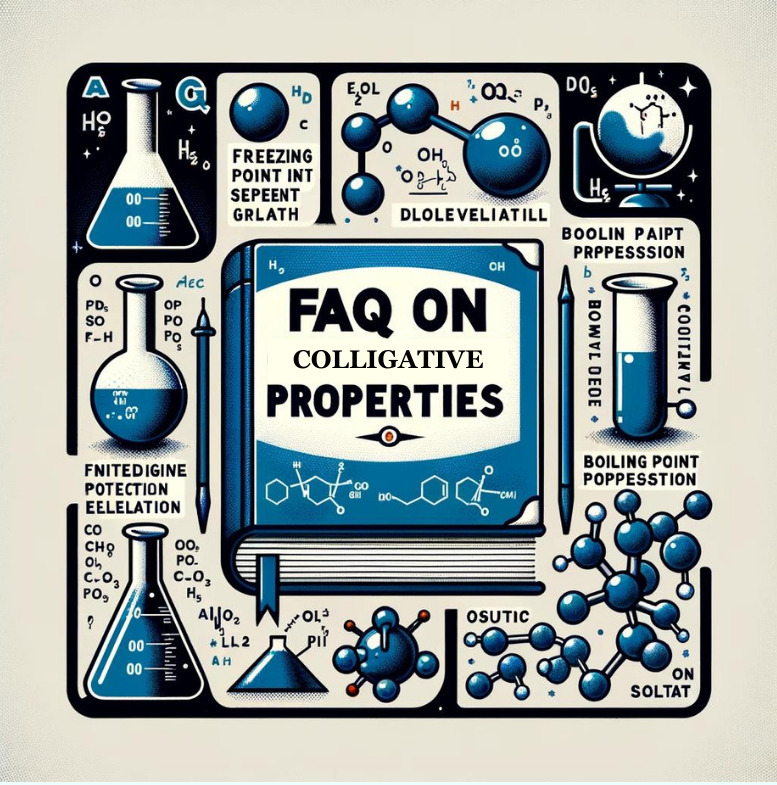Table of Contents
Question: What are some of the most significant “colligative characteristics” aspects to cover?
Answer: Important subjects in colligative characteristics of solutions, according to the JEE syllabus, include:
-
- Relatively lowers the solvent’s vapour pressure.
- The freezing point of the solvent has dropped.
- The boiling point of the solvent is raised.
- The solution’s osmotic pressure.
<liFactor Van ‘t Hoff.

Question: What are Colligative Properties?
Answer:
- Some features of dilute solutions containing non-volatile solutes are dependent only on the number of solute particles present, not on the type of solute present. These are referred to as colligative qualities. These characteristics are particularly noticeable in dilute solutions.
- We can also think of colligative qualities that result from the dissolution of a non-volatile solute in a volatile solvent. In general, the solute alters the solvent characteristics by removing some solvent molecules from the liquid phase. The solvent concentration is also reduced as a result of this.
- Meanwhile, colligative qualities are stated to be inversely proportional to the solute molar mass when we talk about a certain solute-solvent mass ratio.
Question: On adding a non-volatile solute to a solvent, the following effect is observed;
- Increase in vapour pressure
- Increase in freezing point
- Decrease in osmotic pressure
- Decrease in vapour pressure
Answer: Option (d)
The molecules of a pure solvent occupy the whole surface of the solvent. When a nonvolatile solute is added to a solvent, the surface now contains both solute and solvent molecules, reducing the proportion of the surface covered by solvent molecules. Because the vapour pressure of the solution is completely due to the solvent, the vapour pressure of the solution is lower than that of the pure solvent at the same temperature.
Colligative properties are physical properties of solutions that are directly dependent on the number of solute particles (moles of solute) in the solution, _regardless_ of the type of solute or solvent. These properties are independent of the nature of the solute and solvent. Colligative properties are influenced by the concentration of the solute and are observed in dilute solutions.
Question: What are colligative properties?
Answer: Colligative properties include:
- Vapor pressure lowering
- Boiling point elevation
- Freezing point depression
- Osmotic pressure
Question: Which of the following is not a colligative property?
Answer: Let’s consider the following options:
- Vapor pressure lowering
- Boiling point elevation
- Freezing point depression
- Solubility
Solubility is not a colligative property because it is not directly dependent on the number of solute particles in the solution. Solubility is influenced by the nature of the solute and solvent.
Question: Which of the following is not a colligative property?
Answer: The option that is not a colligative property is:
4. Solubility
Question: Which of the following is a colligative property?
Answer: The options that are colligative properties are:
- Vapor pressure lowering
- Boiling point elevation
- Freezing point depression
Question: What are colligative properties give example?
Answer: Let’s consider an example of boiling point elevation:
Consider a solution made by dissolving 1 mole of a non-volatile solute (e.g., glucose) in 1 kg of water. The boiling point of the solution will be higher than the boiling point of pure water. This is because the solute particles lower the vapor pressure of the solution, and the solution needs to be heated to a higher temperature to reach its boiling point.
In this example, the boiling point elevation is a colligative property. The boiling point of the solution is directly dependent on the number of solute particles (1 mole) in the solution, and it is independent of the nature of the solute (glucose) and solvent (water).
Question: By combining n-heptane and ethanol, a binary liquid solution is created. Which of the following claims about the behaviour of the solution is correct?
- The solution that has been created is ideal.
- The answer is non-ideal, deviating from Raoult’s law in a positive way.
- The answer is non-ideal, as it deviates from Raoult’s law in the negative direction.
- N-Heptane deviates from Raoult’s law in the positive direction, whereas ethanol deviates in the negative direction.
Answer: In comparison to pure components, the interactions between n-heptane and ethanol are weaker.
Are Colligative properties physical or chemical?
Colligative characteristics are the physical changes that occur when a solute is added to a solution. Colligative qualities are dependent on the number of solvent particles and the amount of solvent but not on the form of the solvent particles. They do, however, depend on the kind of solvent.
Why is Molality used in Colligative properties?
Because colligative qualities are solely dependent on the number of particles in the solution, molality is not only employed in freezing depression points for colligative properties. Molality, like molarity, is unaffected by changes in temperature. When the temperature varies, the volume changes slightly, and the molarity changes.
What are the other Colligative properties of the solution?
The colligative properties of a solution are those that are affected by the concentration of molecules or ions in the solute but not by the solute's identity. Vapour pressure is reduced, the boiling point is raised, the freezing point is lowered, and the osmotic pressure is reduced.
What does freezing point depression mean?
Depression as a result of Freezing Point The freezing point of a solution is lower than the freezing point of the pure solvent. This implies that a solution must be cooled to a lower temperature than the pure solvent in order to freeze.
What are the colligative properties of a non-volatile solution?
Some features of dilute solutions containing non-volatile solutes are dependent only on the number of solute particles present, not on the type of solute present. These are referred to as colligative qualities.



